NCERT Solutions for Class 10 English First Flight Chapter 1 – A Letter to God
NCERT Solutions for Class 10 English First Flight Chapter 1 – A Letter to God help students explore themes of faith, hope, and irony within the CBSE curriculum. These well-structured answers enable learners to understand the emotional depth and societal message conveyed in the story. Designed according to the latest syllabus, these solutions support critical thinking and exam preparation, making them ideal for quick revision and comprehension enhancement.
NCERT Solutions For Class 10 English (First Flight) – A Letter to God – Exercise Images
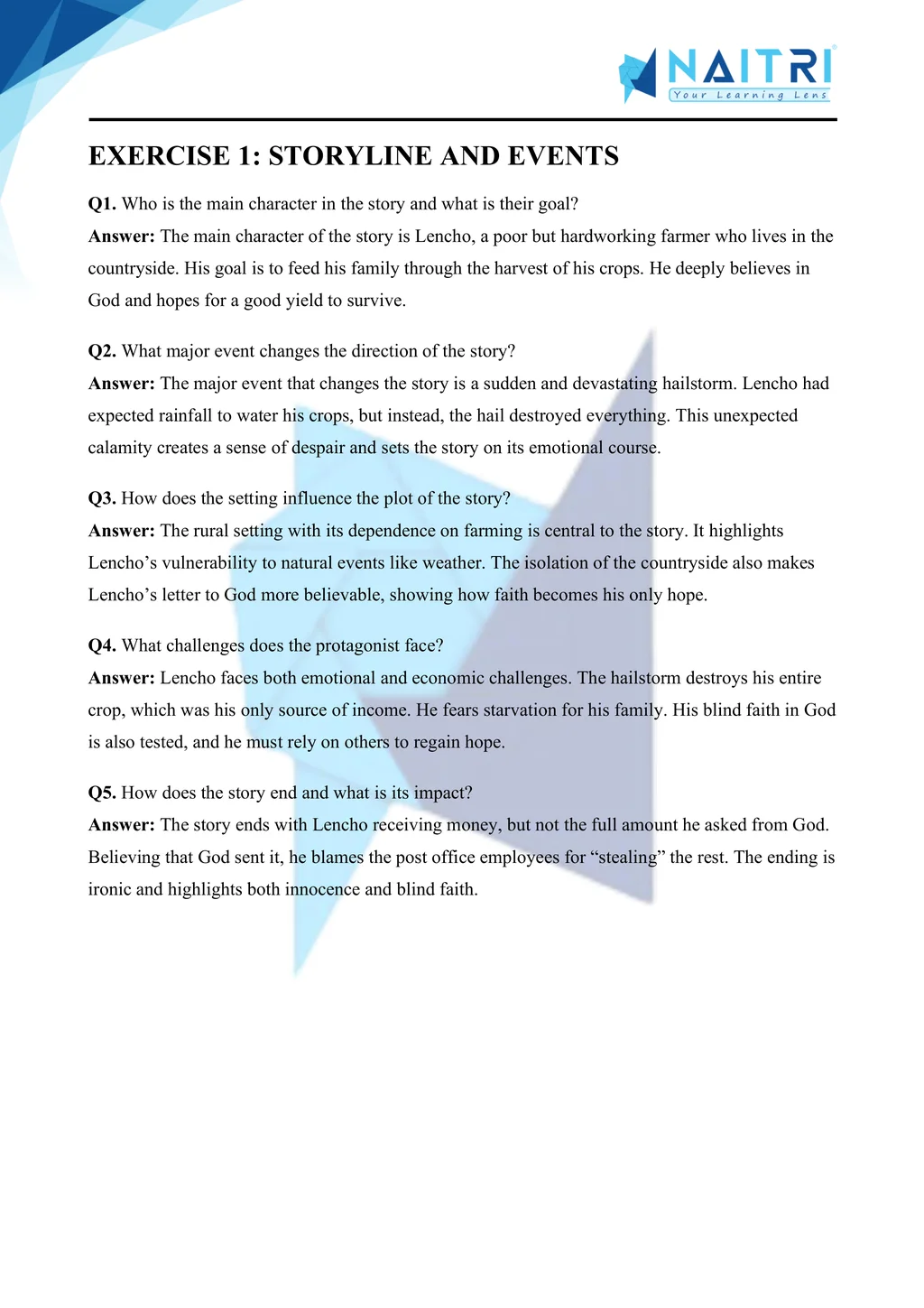
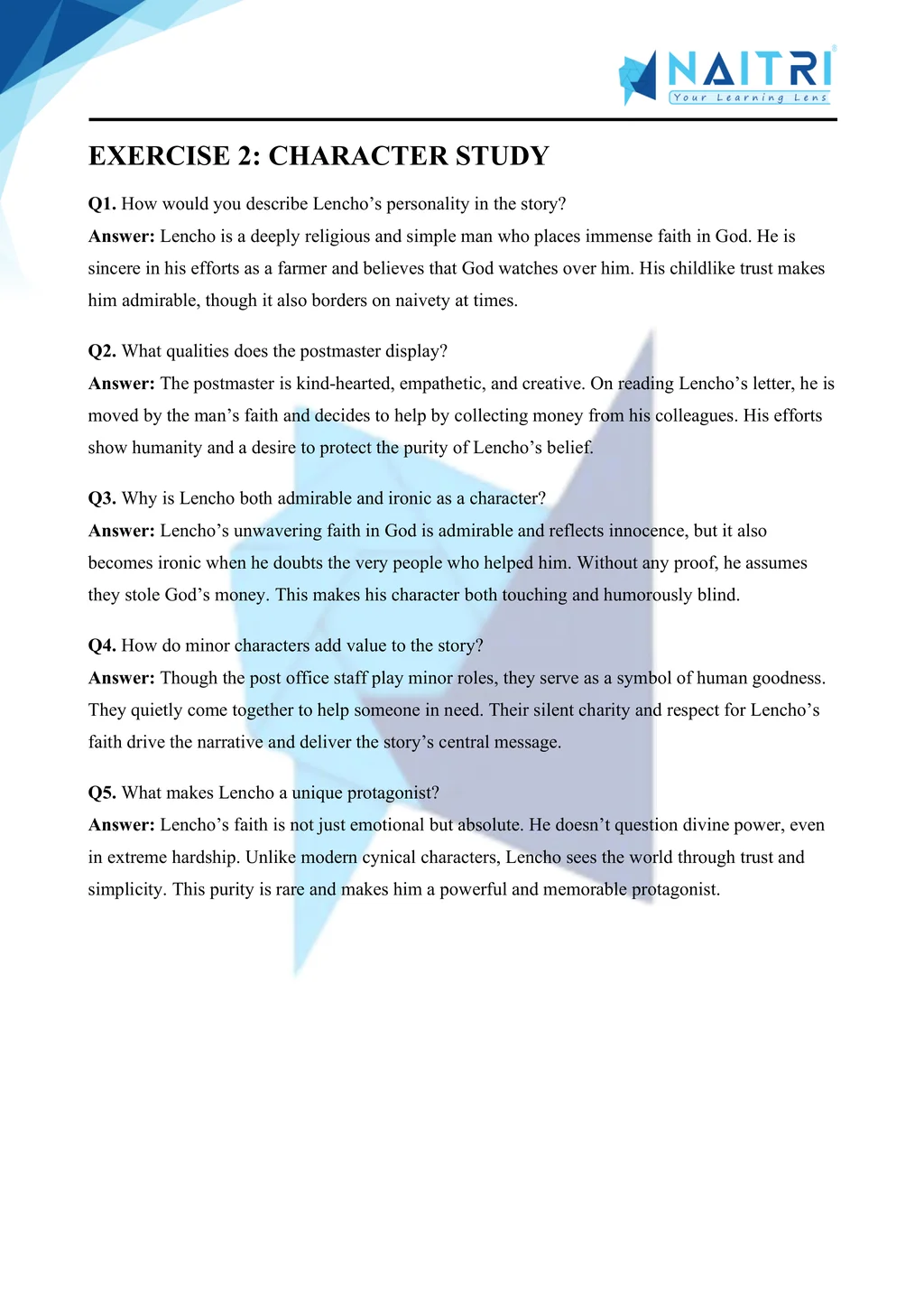
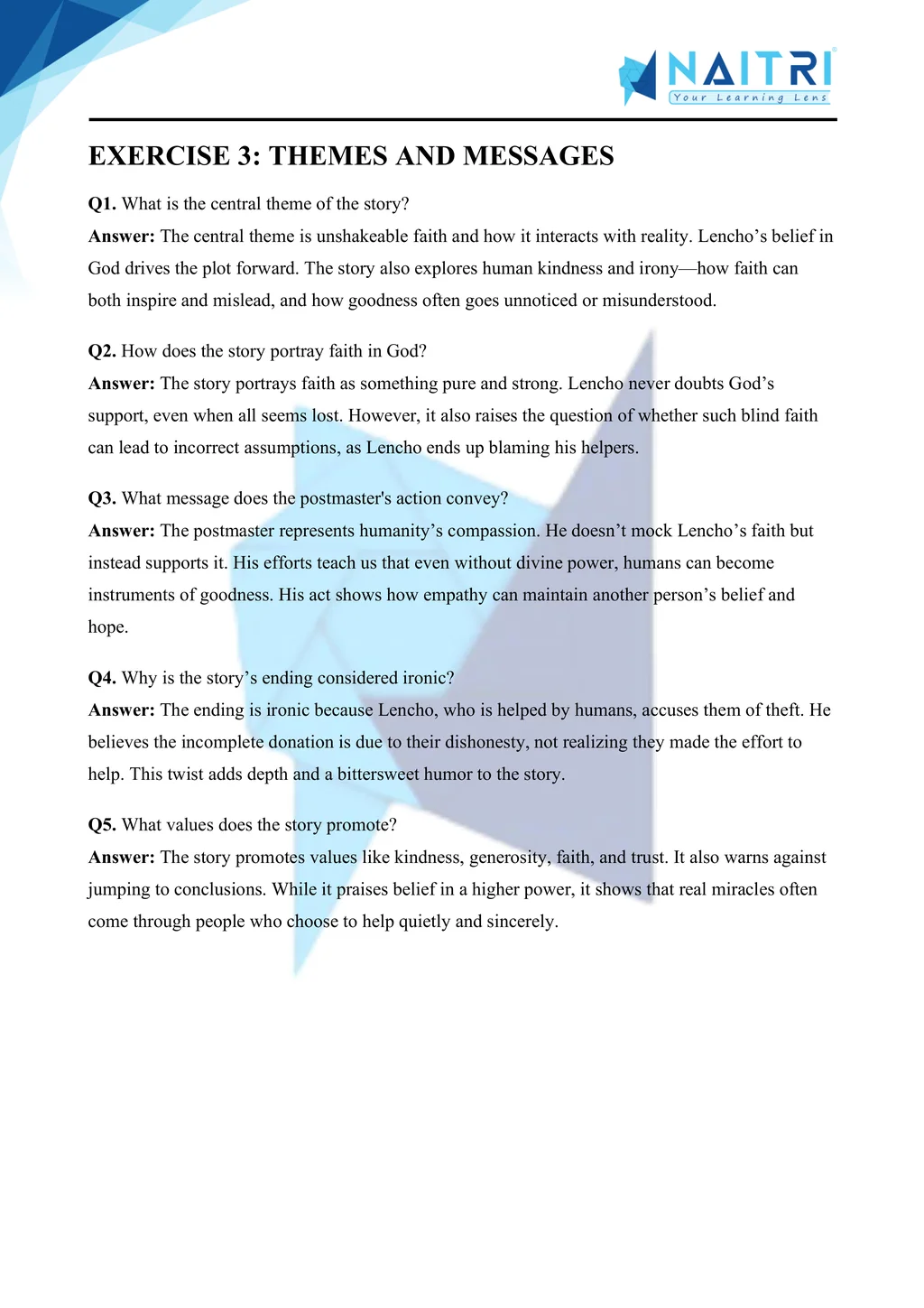
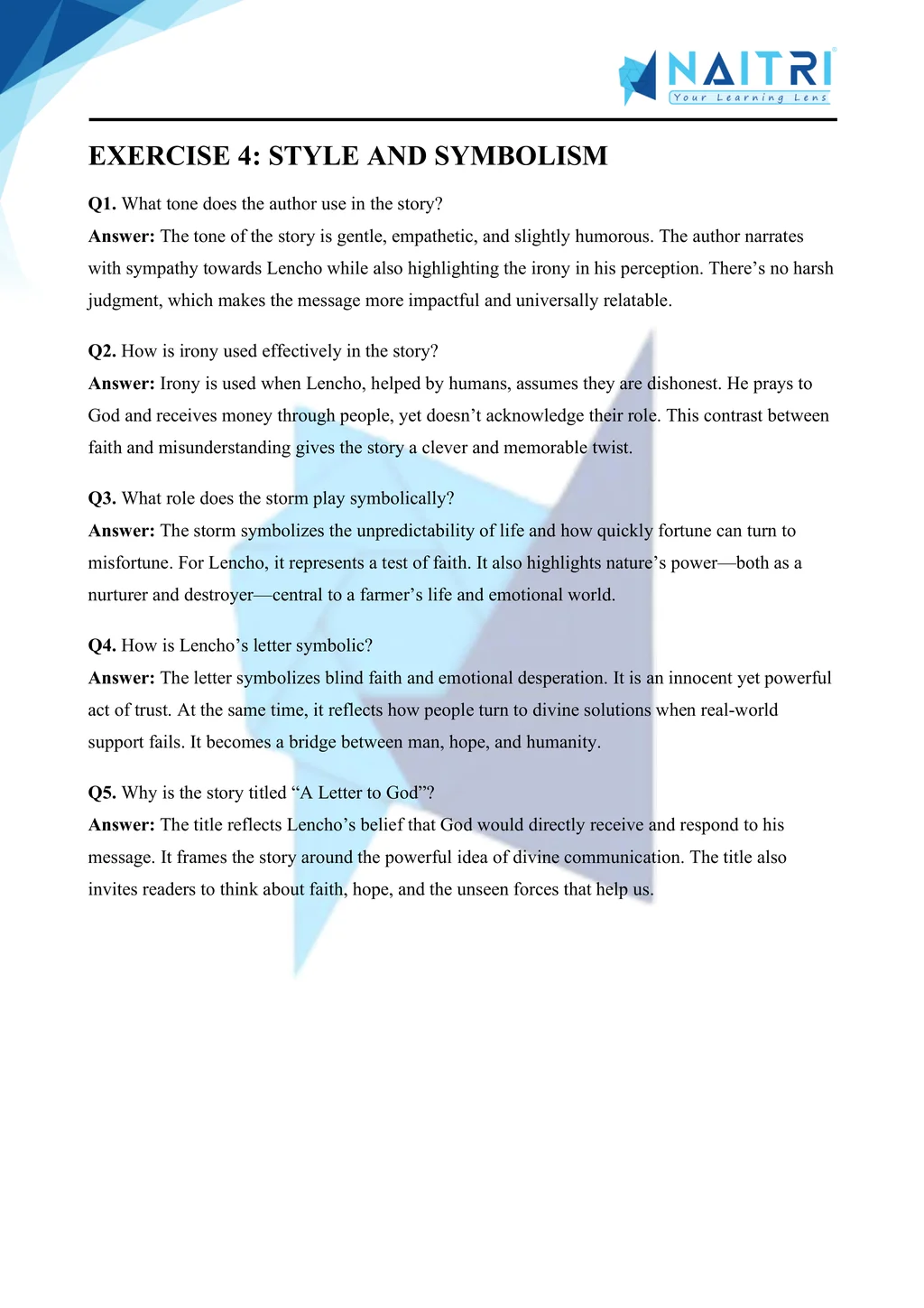
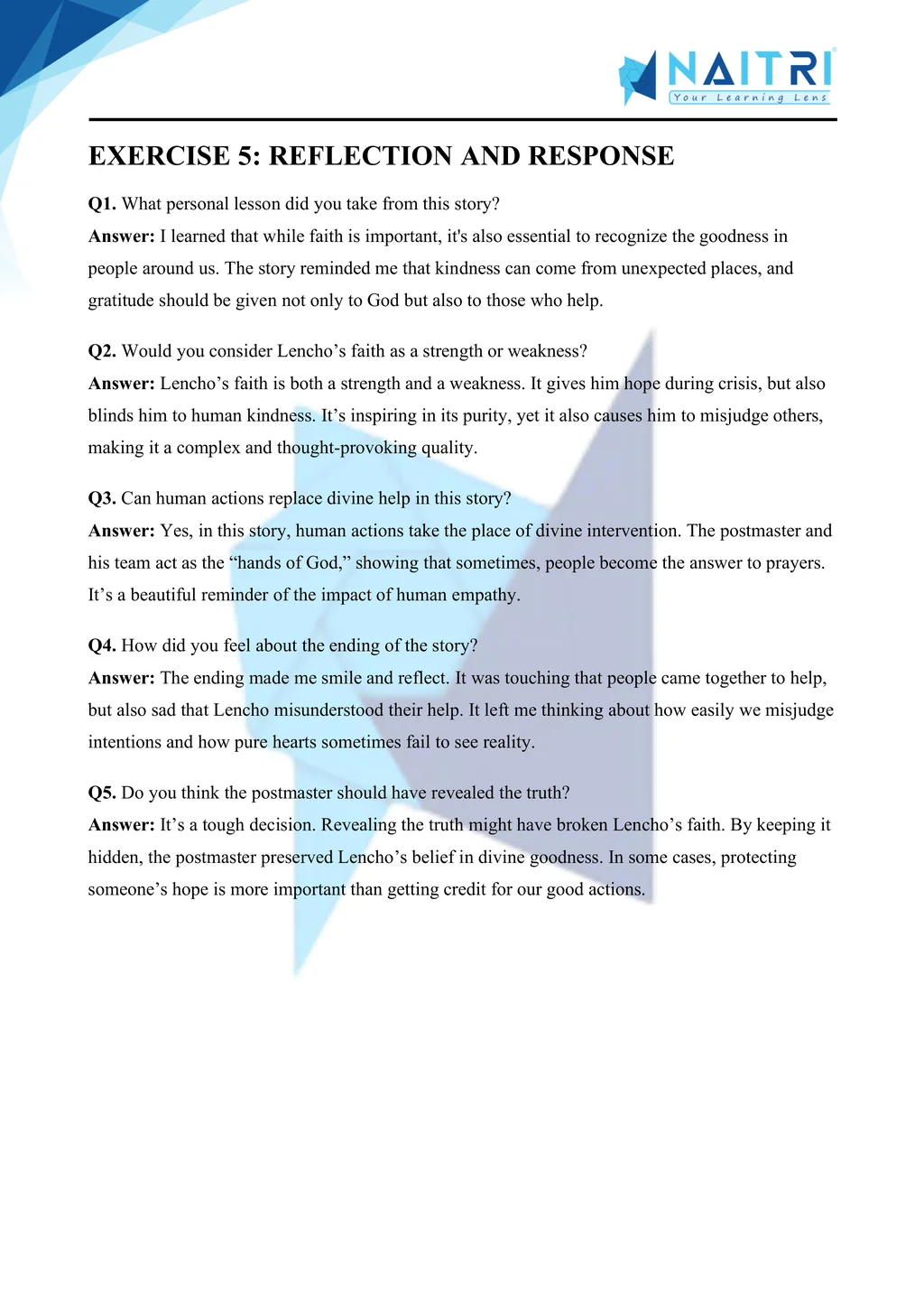
Experience English Like Never Before – With AR!
Understanding A Letter to God is now more exciting and immersive! With the NAITRI App, you can explore engaging literature through Augmented Reality (AR). Experience Lencho’s faith in divine help, the emotional tension, and the ironic twist — right in front of you. Our AR-powered lessons make learning interactive, 3D, and fun, helping you retain concepts better and enjoy every topic.



Visualize . Interact . Understand . The future of learning is here
A Letter to God – Important Questions with Answers
1. Who is the main character in the story “A Letter to God”?
Answer: The main character is Lencho, a poor but hopeful farmer, who believes deeply in God and depends on nature for the success of his harvest.
2. Why was Lencho waiting for the rain?
Answer: Lencho hoped for rain because his crops depended on it. He believed that a good shower would ensure a bountiful harvest for his family’s survival.
3. What happened when it finally rained?
Answer: At first, raindrops brought joy, but soon turned into a hailstorm, destroying Lencho’s entire crop, leaving him devastated and without hope of survival.
4. How did Lencho react to the destruction of his crops?
Answer: Lencho was heartbroken but didn’t lose faith. He decided to write a letter to God, believing only God could save him from starvation.
5. What did Lencho ask God for in his letter?
Answer: Lencho asked God for 100 pesos to sow his fields again and support his family, showing his unshakable faithin divine help.
6. Where did Lencho post the letter?
Answer: He posted the letter in the local post office, addressing it simply to “God”, which surprised the postmaster and his colleagues.
7. How did the postmaster react after reading Lencho’s letter?
Answer: The postmaster was moved by Lencho’s faith and decided to help him. He collected money from his staff and contributed himself.
8. How much money did the post office manage to collect?
Answer: The post office staff managed to gather only 70 pesos, much less than Lencho’s request, but they hoped it would still help.
9. What did Lencho think when he received the letter from God?
Answer: Lencho was not surprised to receive the letter but became angry upon finding only 70 pesos, thinking post office employees had stolen the rest.
10. What did Lencho write in his second letter to God?
Answer: Lencho asked God not to send the money through the post office again, calling them “a bunch of crooks”, unaware they had helped him.
11. What is the irony in the story?
Answer: The irony lies in the fact that Lencho mistrusts the very people who helped him, thinking they were dishonest, while they acted selflessly.
12. What does Lencho’s character reveal about his personality?
Answer: Lencho is shown as a deeply religious, innocent, and determined man, who has absolute faith in God but fails to understand human kindness.
13. How does the story highlight faith in God?
Answer: The story shows that faith can give people strength, even in crisis. Lencho’s belief in divine help reflects the power of unquestioning trust.
14. What lesson do we learn from the postmaster’s actions?
Answer: The postmaster teaches us about human empathy, kindness, and how sometimes, people act as instruments of God to help others.
15. What is the central theme of the story?
Answer: The central theme revolves around faith, innocence, and human goodness. It contrasts blind belief in God with real acts of kindness from humans.
16. How is the title “A Letter to God” justified?
Answer: The title is justified as the entire story revolves around Lencho’s letter to God, showing the depth of his faith and desperation.
17. What kind of a farmer was Lencho?
Answer: Lencho was a hardworking, optimistic, and experienced farmer, who had complete dependence on nature and belief in divine support.
18. What role did nature play in Lencho’s life?
Answer: Nature was both a source of livelihood and destruction for Lencho. While he depended on it, it also ruined his harvest with a hailstorm.
19. How does the author use contrast in the story?
Answer: The author contrasts Lencho’s faith in God with the practical help from humans and also contrasts rain as hope with hail as destruction.
20. How did Lencho justify the loss of money in the second letter?
Answer: Lencho believed the missing 30 pesos were stolen by post office employees, showing his naivety and lack of awareness about human generosity.
21. What does Lencho’s second letter reveal about him?
Answer: It shows his innocence, honesty, and lack of understanding of how humans can also act out of compassion, not just selfishness.
22. What emotions did Lencho go through in the story?
Answer: Lencho experienced hope, joy, despair, faith, and anger, which shows the emotional rollercoaster of a man facing both loss and belief.
23. How does the postmaster reflect the spirit of humanity?
Answer: The postmaster reflects selflessness, kindness, and a desire to keep faith alive in others, even though he receives no credit for his help.
24. What literary device is used in “God: if you don’t help me, my family and I will go hungry”?
Answer: This is an example of hyperbole, emphasizing Lencho’s desperation and strong belief that only God’s helpcould save him.
25. What moral lesson does the story teach us?
Answer: The story teaches that while faith is powerful, we should also recognize human kindness, and that compassionis often the true divine intervention.
A Letter to God recounts the story of Lencho, a poor farmer whose crops are destroyed by a hailstorm. With unshakable faith, he writes a letter to God asking for financial help. The postmaster and staff, moved by his belief, secretly collect money to help him, but Lencho’s own suspicion when some is missing becomes ironic. The story highlights innocence, faith, human kindness, and the complexity of perception.
Download Naitri App
Easy, Visual Learning — Right on Your Phone
Learn with Augmented Reality! The Naitri app makes CBSE and MP Board concepts interactive and fun — even in low-resource settings. Watch lessons, complete homework, take tests, and track progress — all in one place. Anytime. Anywhere.
Available on








